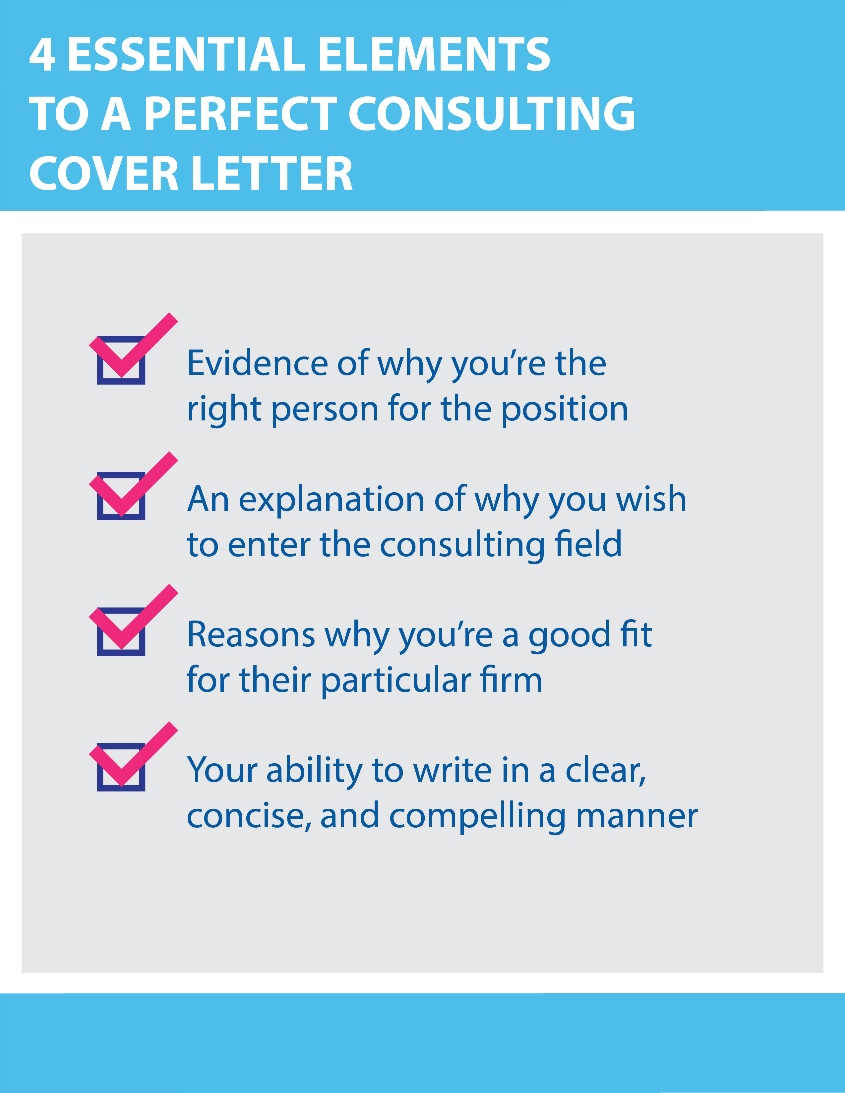FREE Resume Tips Email and Video Series
This form collects your name and email so that we can add you to our email list that delivers the free resources you are requesting. Check out our privacy policy for details on how we protect and manage your submitted data.
We’ll never spam you or share your email. Unsubscribe at any time.
Your cover letter can make a big difference when applying for a management consulting position. Because the cover letter is typically read before your resume, it plays an essential chronological role during the application process.
Consulting firms will typically read your cover letter to quickly identify what makes you different from thousands of other applicants. Therefore, writing a strong and unique cover letter can make you stand out from the competition and ensure that your achievements aren’t overlooked.
A strong cover letter presents an excellent opportunity for you to demonstrate why you’re the best candidate for the job, and to plead your case as to why the firm should hire you over other applicants.
This guide will cover 11 essential steps towards writing the perfect consulting cover letter.
Tip 1 — Know What Consulting Firms Are Looking For
The top consulting firms receive hundreds of thousands of applications each year. For example, McKinsey receives approximately 200,000 applications annually, of which only 2,000 applicants receive an offer. Consulting firms are faced with the arduous task of narrowing down the candidate pool to include only the best.
Interviewing candidates is not a cheap process. The firm wants to ensure that any candidate they interview is qualified for the position, is prepared for management consulting as a career, and is a good fit for the firm.
Therefore, top consulting firms look for four essential elements in a cover letter.
- Evidence of why you’re the right person for the position
- An explanation of why you wish to enter the consulting field
- Reasons why you’re a good fit for their particular firm
- Your ability to write in a clear, concise, and compelling manner

When reading cover letters, screeners will often ask,“Did the applicant spend enough time preparing a strong letter? Have they done their homework regarding the firm and the position in question? Do they have adequate writing skills to prepare compelling emails, reports, and presentations?“
A cover letter is a challenging document to prepare. You may feel worn out after spending hours on your resume, only to realize that you also need to spend as much time (if not more) on your cover letter.
Rather than looking at your consulting cover letter as an annoying extra step, think of it as an excellent opportunity to emphasize your skills and experiences and to set yourself apart from other applicants.
Tip 2 — Make Sure the Letter Has TheseFiveDistinct Sections
While your cover letter doesn’t need to take a formulaic approach, there are five distinct sections that should be covered. They are:
- An Introduction
The introduction should contain which position you’re applying for, your name, address, and contact information. It should also be short, sweet, and entertaining. Write it in such a way that the screener will want to keep reading into the second paragraph.
- Why You’re a Great Candidate
This is the section where you should blow your own horn. Each sentence should speak to your skills, education, and experiences — tying everything back to why you’re a great candidate. Ideally, this section should include your top three achievements to date (relevant to consulting, of course).
- Why Consulting is the Right Fit for You
Remember that the top priority of most consulting firms is to find out whether you’ll become a great consultant if hired. Even with memorable and unique qualifications, a recruiter may not be convinced that these skills will make you a good management consultant. To leave no doubt in their mind, dedicate a section towards explaining why you’re the right person for the job. You can use previous experiences (such as internships, jobs, or academic courses) to tie your career goals to the position in question.
- Why You’re Applying for the Position
The next section should cover why you chose to apply for this exact position in this firm. When laying out your case, identify unique reasons as to why you think McKinsey, Bain, BCG, Deloitte, or any other firm is your firm of choice. To make a compelling argument, identify specific people, reports, or projects that make your story believable. Don’t hesitate to mention specific employees or projects that caught your eye and sparked your interest.
- A Solid Conclusion
Finalize the letter by restating why you believe you’re a great candidate and how you can be of value to the company.
Tip 3 — LinkYour Cover Letter to Your Resume

A consulting cover letter is essentially an opportunity for you to expound on the information you wrote in your resume. What does this mean? It means that your cover letter should highlight the unique achievements, skills, and experiences (relevant to the position) that make you stand out from other applicants.
Your resume and cover letter should work hand in hand to strengthen your application further and demonstrate what makes you stand out.
Start off by identifying what you want the consulting firm to know about you. Draw attention to your career achievements. Maybe you started a business and sold it for a significant profit, or you worked overseas for a few years and have a diverse skillset.
Make sure that unique experiences are mentioned in the first few paragraphs of your cover letter to pique the interest of the resume screener.
Many resume screeners don’t actually read your entire resume.They simply scan it to identify specific items that make you stand out. Because resume screeners scan through hundreds of resumes at a time, they can easily overlook your unique achievements.
The cover letter is your opportunity to prevent this from happening. When you go into detail about achievements in your cover letter, you essentially draw the attention of screeners (and thus give yourself a better chance to land an interview).
Tip 4 — Don’t Forget About Your Resume
Even after referencing the unique skills you have in your cover letter, you need a strong consulting resume to back up your claims. A consulting resume is different from other standard template resumes, as it needs to emphasize a combination of skills that can make you successful as a consultant.
Here are resources that can help you prepare a strong consulting resume. A quality consulting resume will take just as much attention to detail as writing a strong cover letter will. In a nutshell, writing a consulting resume requires you to reflect on your past experiences, select the ones that are most relevant to consulting, and summarize them in a manner that resume screeners can easily scan and digest.
Top consulting firms typically look for the following in your resume:
- Big brand names (employers and schools)
- Strong academic performance (high GPA)
- Strong analytical skills (demonstrated in high standardized test scores)
- Strong leadership and communication skills
- Achievements versus career years (the longer your career is, the more achievements that screeners expect to see)

Also, refer to this resource to identify the top five mistakes that applicants make when writing a consulting resume.
Tip 5 — Avoid Using a Standard Template for Your Cover Letter
It’s no secret that it can be a pain to write a strong cover letter. It takes a lot of time and reflection. You’ll have to revise and edit the piece multiple times before submitting it. But, to truly stand out from other applicants, your letter needs to be interesting, personal, and unique.
The biggest mistake you can make is to copy a standard cover letter template and simply plug in your name and skillset. Screeners hate standard form letters because they’re boring to read, and they show that you’re unwilling to put in the necessary time and effort to write something unique. Because recruiters read thousands of cover letters, they can easily tell when a cover letter is written from a template.
When writing your consulting cover letter, make sure that every sentence is unique. While you may draw inspiration from various templates, add your personal twist to each word and modify it in a manner that emphasizes your unique skillset. For example, instead of starting with the usual format:
“Dear Sir/Madam, I write to apply for a consulting position….”
You can make things more interesting by starting off with what makes you different. Here’s an example:
“After attending Harvard for both my undergraduate and MBA education, I am confident in my ability to become successful as a [insert job position here] at McKinsey.”
Another example:
“My experiences overseas as a Peace Corps volunteer put me in a position to be successful as a [insert job position here] at BCG.”
The idea is to make every sentence in your cover letter count. Add a personal twist to all ofyour skills and experiences and tie them to the job responsibilities of the open position.
Tip 6 — Highlight Your Skills and Experiences via Evidence-Based Storytelling
In your cover letter, the goal should be to tell your story. Rather than simply listing your skills and abilities, demonstrate how various experiences have molded you into the perfect candidate for the position in question. Strive to show that you have what it takes, instead of telling.
For instance, instead of simply stating that you can lead, give a specific example of an experience where you showed leadership qualities. This evidence-based approach shows recruiters that your prior experiences have equipped you with the necessary skills to be successful.
Telling a story makes your cover letter much easier to read. It also makes you stand out from thousands of other applicants who may simply state “I’m a leader,” or, “I’m a hard worker.”
As you use this evidence-based approach, tailor every experience you mention to a specific skillset that is required for the job. If the position requires a candidate with strong interpersonal skills, explain a time when you worked within a team to achieve tangible results. Also, list out any challenges and how you overcame them.
It’s not simply about telling a story. Rather, it’s about telling a story that highlights why you’re a good fit for the job, as well as what makes you stand out from the competition.
Tip 7 — Show Your Value
A common mistake that many applicants make is to only think about personal achievements when applying for consulting positions. Recruiters often read through cover letters that have lots of “me meme” in them.
This is to say that many applicants focus on how they can benefit personally from the position in question, instead of demonstrating how they can become valuable employees (and eventually partners).
Many cover letters talk only about how the candidate will be able to elevate his/her career, experiences, and skills. Such letters only focus on personal goals instead of demonstrating how you can help the company become better. Remember that screeners are looking for candidates who will be of benefit to the firm, not those who are simply using this as an opportunity to enrich themselves and their careers.
When writing your cover letter, emphasize how your skillset will be of benefit to the company. To do this successfully, you need to do your research with regards to what the short-term and long-term goals of the firm are. You can then use these goals and relate them to your unique abilities and experiences.
Tip 8 — One Page Is the Perfect Length
It can be tempting to write a long cover letter, especially if you have a diverse skillset that you feel should be highlighted. However, being concise and keeping it relevant to the position is a much better strategy.
Aim to select only the most relevant experiences that apply directly to the position you’re seeking. You can typically fit these experiences in only one page.
Being concise also makes it easier for recruiters to read through your cover letter quickly without overlooking anything. Edit it down to a concise letter by re-reading and adjusting your original cover letter. The more you read it, the more unnecessary words and content you will find to take out.
Start early so that you can give yourself plenty of time to adjust your cover letter accordingly.
Tip 9 — Be Specific About the Position You’re Applying To
While this may sound obvious, many applicants tend to go off on a tangent about their skills and abilities without first mentioning the job they’re applying for. You should always state the position and office of the job you intend to apply for within the first sentence.
Remember that this information can still be included as you emphasize what makes you different. Here’s an example of an opening sentence that was used earlier in this guide:
“My experiences overseas as a Peace Corps volunteer put me in a position to be successful as a [insert job position here] at BCG.”
Being specific and concise about the job you’re applying for will make it easier for screeners to quickly recognize which position you are interested in.
Tip 10 — Give Yourself Time to Write a Quality Letter
Similar to consulting resumes, writing a strong consulting cover letter takes time. To be successful, you need to consider everything you’ve accomplished as well as what makes you different from everyone else. Don’t think that you can write a strong cover letter in one night. It requires multiple iterations, careful re-reading, and timely feedback.
You also need to make sure that the cover letter blends seamlessly with your resume, and it expounds on the outstanding skills and experiences contained in the resume itself.
Tip 11 — Proofread Thoroughly

And finally, make sure you eliminate any grammatical or spelling mistakes from the final cover letter. These mistakes make you appear careless and can result in being disqualified in the screening process. Don’t let something so simple be your downfall.
Take time to proofread. Ask peers and fellow professionals review your cover letter and give you feedback as well.
Example
Here is an example cover letter that highlights the tips I’ve mentioned. Reference this example as you write your cover letter to make sure that you hit all of the important sections. These items do not necessarily need to appear in the order I have them listed. But, make sure that they are all represented in your cover letter. Below is an example consulting cover letter.
You can also download the example by clicking here.

More Resources:
Free Case Interview Prep Program – Sign Up For Free Instant Access to the Largest Collection of FREE Case Interview Training Resources.
We’ll never spam you or share your email. Unsubscribe at any time.




219 thoughts on “Consulting Cover Letter Tips (and Template)”
Hi Victor,
Firstly thank you for a fantastic website and Case Interview Secrets book.
Most of the comments I’ve read tend to refer to GPAs and North American Universities. I’m wondering if you could shed any light on the UK system.
I graduated 2 years ago with a 2:1 undergrad from Manchester Business School (seems to be a fairly well respected university but non-target). Did internships at BoA Merrill Lynch during university and at Citi (S&T) following graduation. Some interesting extra curriculars (DJed at a fairly high level, committee positions) Now working on my 2nd early stage (non-VC backed) entrepreneurial venture. I haven’t done any standardised tests.
– How do you feel this type of background is viewed among the different tiers of consultancy firms. Possible to get an interview for MBB or more looking at 4-10, 10 ?
– In a cover letter, what would you say is a well-regarded way to market a background in finance and entrepreneurship for pursuing a career in strategy consulting?
Thanks very much for your time.
Philip
Philip,
The challenge with your background is there isn’t an objective numerical comparison that can be made between you and other candidates. If your GPA is well understood in the UK, than there is no need to do anything differently in how you present it
When applicants are educated in one country and apply in another, I recommend they attempt to covert all of their grades in percentile rank. If you’re in the top 5% of your class, that’s understood across all countries and cultures.
Your previous employers are competitive with other candidates. The small company employer as the latest employer is a negative, as is the non target school. It can be offset with networking exceptional case performance. I don’t know how well respected Manchester is but at McK most of the consultants are Oxbridge folks, a few LSE and equivalents if that provides any reference.
I would say the top 3 firms would be difficult for you. The top 4 – 10 may be within easier reach for you.
-Victor
Hi Victor,
Truly amazing and valuable input out there. Looking at all the comments you have covered most of the common doubts. I wanted to know if McKinsey (or any top tier consulting firm) has any team dedicated to Business Consulting Associate for helping top pharmaceutical companies in vendor selection for selecting IT systems (Manufacturing Intelligence is what I am hinting at).
I wanted to ask and may be you might be familiar to it or may be not but McKinsey as a top notch consulting firm must be assisting global pharma / biotech companies in vendor selection or for that instance solving current business needs of customers
Any insights into this Victor would be highly appreciated
Thanks
Hi Victor
Your website is really informative and it’s been indispensable as a tool. I’ve been practicing for a full month now in anticipation of the November 2014 recruitment season.
My question concerns the resume actually – I have an undergrad from a non-target school but I came out top of my class and was awarded best MA thesis in a class of 150 student. I’m now doing a science PhD at Oxford University in the UK and looking to go into the MBB and/or next top 7 London offices. I have worked part time for an unknown consultancy, but for big clients like a UK Government agency, and two global pharma companies and presented in corporate workshops to the COO and board members (actually flying out of the UK to continental Europe to present at the client HQ). In my resume I’ve put UK Government and global pharmaceuticals instead of naming names. I’ve received mixed advice from people – some agree with this approach since they feel it is unprofessional to list client names in the resume while others feel that the names are so big that they would draw a lot of attention and as such, I should capitalise on it. What would your advice be (when you factor in my non-target undergrad and current target post-grad) to maximise my chances? I’d really appreciate your thoughts on this sensitive topic as I don’t want to ruffle any feathers in the first step of a long process!
Thanks so much,
Niki,
With cover letters and resumes recognizable brand names are VERY important. If your firm is not well known, but your clients are, it is to your benefit to list client names. However, if your employment agreement with the firm prohibits you from disclosing client names (my agreement with McKinsey from years ago considers client names confidential, so even to this day I can not disclose the clients I served) you should honor those agreements and not disclose information you are contractually obligated to not disclose.
Of course, I am not an attorney and you should check with one for a reliable legal opinion. Purely from a resume or cover letter standpoint, recognizable names are better than non-recognizable ones.
Victor
Hi Victor,
Thanks so much for the wonderful resources on the website. I’ve been recommending the LOMS and Case Interview Secret book to members of the Consulting Club at my school.
I’m an undergrad Senior from ivy school with a 3.8 GPA, 2300 SAT, looking to MBB full-time. I interned at BCG in Asia and at UN in NYC these past two summers.
Given the background, I’m wondering if my time would be best spent starting a new internship with a boutique investment firm or VC in NYC to maximize the chances of getting interviewed (interviews are in Oct.) or focus exclusively on case interview prep. Would you have an advice? Thanks so much!
James,
Prep. Definitely prep. Ivy good scores good GPA 2 big brand name internships = very competitive resume. Ideally you want to empathize both analytical and people skills in your internship experiences. Also MBB interns very often get interviewed by the other consulting firms. You have a very high probability of getting interview opportunities. Put the time into case prep attending recruiter events on campus getting to know the consultants who come on campus for recruiting events. So case prep is first priority, second priority is networking / relationship building.
Victor
Hi Victor,
I have completed my PhD degree in biology, and I would like to enter the world of consulting (Mckinsey, Bcg, etc.). I have no experience in consulting (but have work experience in sales, hospital, research).
What should I write in my cover letter to catch the attention of recruiter’s eye?
Thanks a lot.
Hi Victor,
Great website. I am a fourth year medical student currently (at a state medical school) but am in the process of applying to consulting firms. I graduated from Northwestern in 3 years with an economics degree and a 3.7 GPA, have high standardized test scores, and just passed Level 1 of the CFA exam. Do you think the big 3 (Bain/BCG/McKinsey) would consider interviewing me or should I focus my efforts on health care consulting firms like Huron, ZS Associates, IMS, etc
Hi Victor,
I’ve been scanning your website heavily for info for the last week now, and have watched almost all your videos from the Harvard Business case study seminar. It is all great info, and your site offers a knowledge that is really unparalleled on the web.
With that being said, I’m trying to gauge if I have a shot at McKinsey. If I don’t, I don’t want to waste too much valuable time on an app and cover letter.
I go to Columbia, and will be graduating in spring 2015 with a Master’s of Public Health, specializing in Health Policy and Practice and Epidemiology. My GPA is a 3.22, I’ve been interning at a large health insurance company for the last 4 months (doing product and process improvement), interned at a health policy research startup for 4 months prior, and worked as a data manager at a non-profit research institute for a year and change before that.
My BA is in a social science at a non-target school with around a 3.3 gpa, and my SAT scores are crap, around the 50-60th percentile. My GRE scores are ok, 156;162;5/6 for math,verbal, analytical.
My strategy is to write a unique cover letter to stand out, then ace the case interview. Will my efforts be in vain?
Thanks Victor, appreciate your content!
Mark,
Unfortunately, I don’t think you’re close to the McKinsey cut off. Mainly your GPA and scores are too low. My consulting resume toolkit has a self scoring calculator to figure out if your resume is competitive and includes 100 actual resumes from other candidates – each resume scored with accompanying information as to why each score was given. It isn’t the exact process McKinsey uses but is generally reflective of it.
https://www.caseinterview.com/consulting-resume-toolkit
The toolkit does have a fee so it may not be worth it given your situation. But if you are curious, it should shed greater light on your situation and also explains how to write a compelling resume for consulting and/or industry (within the constraints of the facts of your career history)
Victor
Great Help!! Thanks a lot.
Hi Victor,
I am an alumnus of India’s best universities;’ IIT and IIM. Post my MBA in 2003, I joined Citibank and later quit to start my own venture in retail. I recently sold off my majority stake and wish to utilize my entrepreneurial experience in emerging markets to help a management consulting firm’s clients in becoming successful.
My questions are :
1. Given that I have a 9 year experience, what position is suitable for me in a consulting firm.
2. Do I need to necessarily get back to do an executive MBA to get-in or will my IIM MBA suffice?
3. Do consultanting firms value entrepreneurial experience ?
4. Should I forward my resume through some contacs or is it a good idea to apply online?
I shall be grateful if you can advise me on the above.
Regards
Saurabh
Hi Victor,
I am a final year engineering student at Indian Institute of Technology, Delhi. I got placed in a decent internet firm in India as a product manager after trying by best to get into management consulting roles at MBB and failing to crack the interviews. Now, I am a little perplexed because my firm doesn’t have a big brand name and a year’s work experience at such firm might not help my profile inspite of the fact that my work involves lot of effort from my side.
Therefore, I am planning to get into Masters of engineering management program at some good university in US which might be my last chance to get into an MBB. How should I justify my work experience in the cover letter to turn things in my favor? I have a decent GPA(3.6/4), a few national level math/science olympiad ranks, sports, minors in management, a research paper etc.
Any other suggestions will be helpful